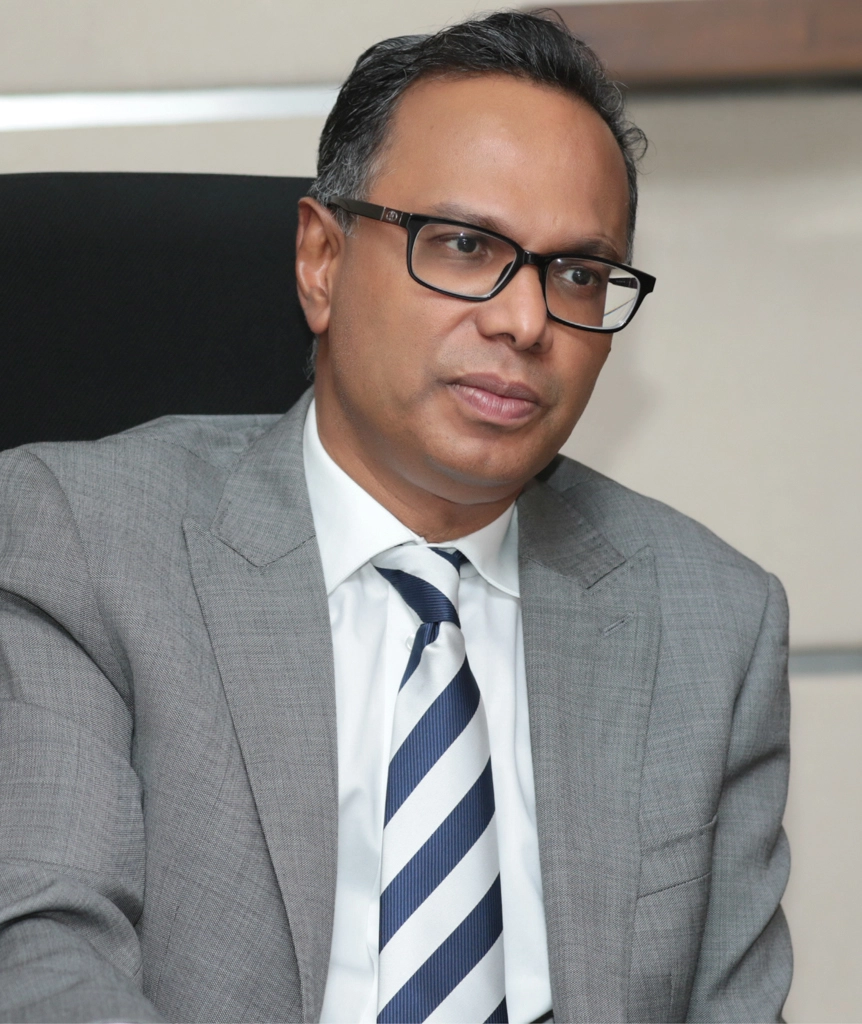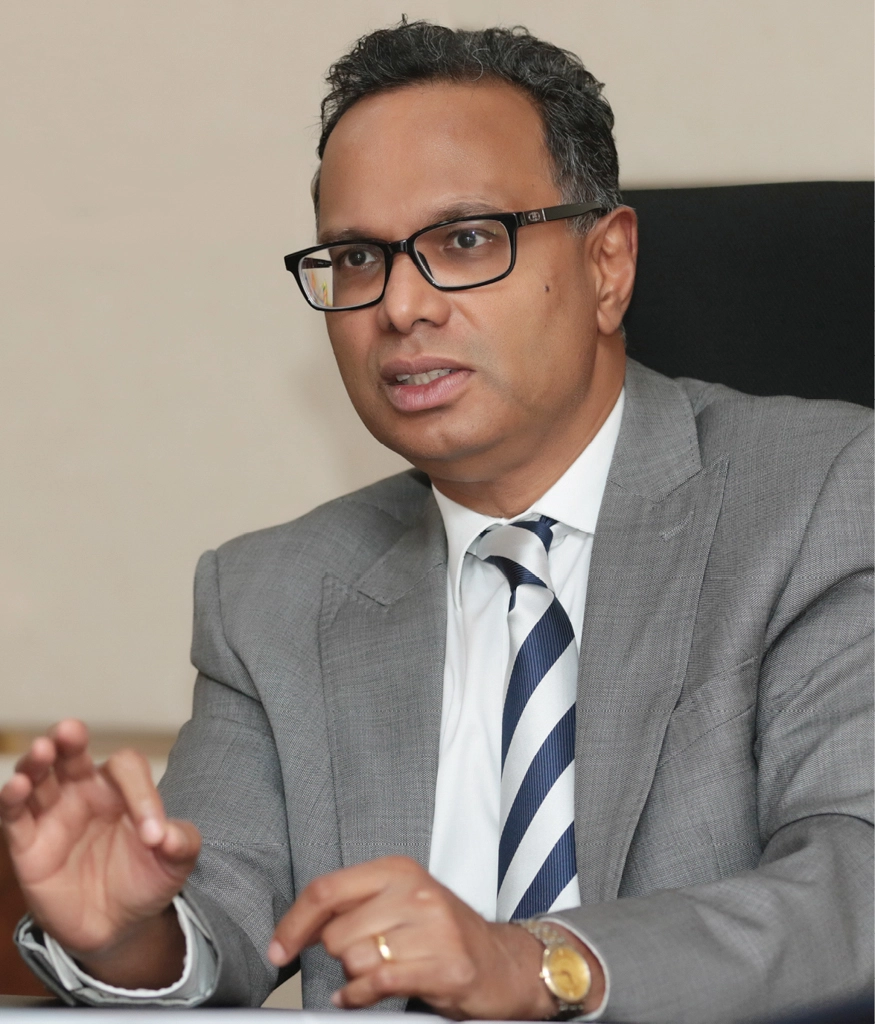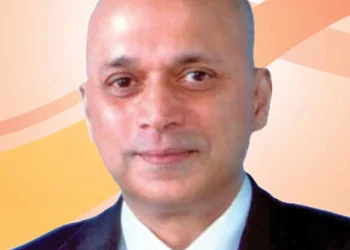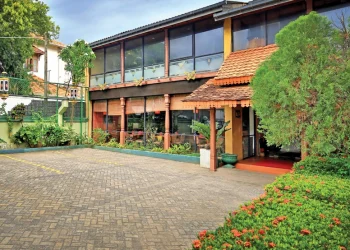
The National Savings Bank (NSB), is Sri Lanka’s only Government guaranteed bank and has recorded its best financial and operational performance to date. At the heart of the Bank’s mission is the responsibility to increase the level of savings in Sri Lanka. Bringing a wealth of experience from overseas as well as Sri Lanka, Aswin De Silva, Chairman, NSB, has steered the Bank to continue to project a positive image and work towards its core goals. He sees great potential in the industry and believes that if you have no hidden agenda, there is much that can be achieved. Aswin De Silva is confident that NSB’s strategies are working to drive growth. He opined that if we believe in ourselves, work with a sense of passion and commitment and take all employees along the journey that this growth is far-reaching and sustainable.
By Udeshi Amarasinghe and Keshini de Silva
Photography Mahesh Bandara and Menaka Aravinda
National Savings Bank, being the only state savings bank in the country, could you elaborate on the journey of the Bank and current position?
The beginnings of National Savings Bank were small. It started with customers using pass books, on which savings were logged through the post office. They would get a stamp depending on the rupee amount. The National Savings Bank was established in 1972 by amalgamating the National Savings movement that included Ceylon Savings Bank, Post Office Savings Bank and Savings Certificates Section of the Postmaster General’s Department. It is due to this association that the Post Master General is always a Director on our board.
Today, we have moved beyond that point although we continue to have the saving books and a network with the postal service; several other channels have been developed as well. From that viewpoint, we have grown to 254 standalone branches and 2,000 post offices with which we have networked for savings. We have close to 4,500 employees and are continuing to grow. I am confident that if we continue in our journey and do the fundamentally right thing first time around, we can grow much further.
The Core Vision Of The Bank Should Always Focus Around Getting The Right Message Across To Sri Lankans To Save, Which In Turn Would Become Mobilised Funding, Primarily For The Development Projects Of The Country.
I believe the core vision of the Bank should always focus around getting the right message across to Sri Lankans to save, which in turn would become mobilised funding, primarily for the development projects of the country. Through the National Savings Bank Act, 60 per cent of the deposits are in government securities. We are responsible to the Government when it comes to mobilising funding for recurrent expenses as well as for investments. That is a major contribution to the finances of our country.
First and foremost, the institution should be safe in delivering products that are relevant to customer convenience and that is an imperative, something that we take pride in. Essentially this is the core to the brand value. Therefore, the journey of the bank, particularly over the past few years, has been to continually strengthen the brand image of NSB. We take criticism and customer feedback very seriously. Whilst we strengthen the brand image by getting our existing customers to believe in us, we also need to deliver on our promise. Once that happens, I think, fundamentally, the rest will follow. NSB is a bank, which requires no introduction, particularly in the rural community that accounts for at least 70 per cent of the country. Whatever we do, we will not harm the brand image. That is what my predecessors have done as well, in all fairness. I will continue to do so in the future as well. Our journey is to do with continually building relationships with the populace of Sri Lanka.
NSB continues to provide a good return for shareholders. We have savings products catering to the entire social fabric across all age groups of this country, from a little child, which is known as Hapan, to the senior citizen, we offer savings opportunities as well as mechanisms. Some are branded, while others are common products. Therefore, we are quite pleased that close to nine million of our population bank with us. I believe less than three per cent of our customer base has less than three million rupees each in the Bank, which means that the Bank is on the right track in providing the necessary financial inclusion of this country across most segments. We believe we are the best place to partner with in terms of that initiative, especially in terms of making people more inclusive when it comes to disciplined banking habits.
NSB Is The First Specialised Bank In Sri Lanka To Reach A One Trillion-Rupee Asset Base And We Are Very Proud Of This Achievement.
NSB is the first specialised Bank in Sri Lanka to reach a one trillion-rupee asset base and we are very proud of this achievement. Over the past three years, our asset base has increased significantly, due to our team effort and the strategies that we have implemented.
This is the only Government guaranteed bank. There is a certain high expectation for your team and yourself. How do you maintain that?
Convincing all stakeholders to agree on our strategic direction is not easy. There are always diverse expectations, but we believe that if we communicate our strategic imperatives with a sense of purpose and integrity, we could take all stakeholders along the journey. The management team and Board members including myself should also be accessible at every possible opportunity for discussions and the airing of views.
NSB will continue to partner with all of its stakeholders to drive the personal and economic prosperity of Sri Lanka’s populace.
There is generally a perception in terms of state banks that the procedures are more cumbersome. Could you explain how NSB is more customer friendly?
I will give you a classic example of a transaction we handled about three months back. The biggest stock market transaction up until that time was the Hayleys takeover of Singer. Hayleys is a blue chip conglomerate in every sense of the word in Sri Lankan terms. They could have approached a multitude of banks to raise funds for this acquisition, yet instead they approached us. We structured the deal, competing with several banks to the satisfaction of our customer. Therefore, we address our minds and work as a team who can deliver to the satisfaction of the customer and compete with any bank.
We have a scheme through which housing loans are offered within 72 hours. Gone are the days when foreign banks performed certain transactions whilst the private banks another set of transactions and the state banks another. That was the status quo when I joined the industry 28 years ago. Now, most banks are competing for a piece of the same pie. We must get our act together at all times, or else we will be running the race, but not winning the race.
Another focus area to be competitive is delivery of our services with integrity. For relationship management to work we should focus mainly on delivering what we promise across all channels. I know, we at NSB, we have not perfected this concept but will continue to strive to do so.
Could you elaborate on the performance of the Bank during the past year?
2017 was a watershed year in the financial performance of NSB. By far, on all counts, it was the best year for the Bank. You will find most banks doing well, inter alia, increased profitability. We placed certain structures through which, I am happy to say, we ticked all the important boxes for this to be the best performing year. Our profit before tax and after tax is the highest in the Bank’s history – 14 billion rupees and 9.6 billion rupees, respectively. In terms of non-performing loans, which is critical and a KPI for all banks particularly in an environment where interest rates were moving rapidly, we recorded the ratio of 1.3 per cent. The lowest in the banking industry. Against all odds, we are probably the only state bank, or rather only large state bank, which did not depend on the treasury for capital to meet Basel III capital adequacy requirements. In fact, over the last few years we paid out record dividends and record taxes. The Bank’s total capital adequacy ratio is over 15 per cent. There are international norms on the amount of capital the banks should maintain to expand the loan book. Therefore, whilst expanding the loan book well above the industry average, we managed to stabilise our capital position as well. The cost income ratio at 38 per cent is the lowest in the Sri Lankan banking industry. Interest income surpassed 100 billion rupees for the first time.
To complement this financial performance , our fully owned subsidiary NSB Fund Management Company, which is the primary dealer in Government Securities too had a creditable year, recording the second highest profit in its history, amidst a volatile interest rate scenario experienced during some parts of the year.
There was tremendous technological advancement during the year as well. For example, we launched a programme called the iSaver with Sri Lanka Telecom and Mobitel to bring about customer convenience in terms of saving. Therefore, I do not believe there is even one year in NSB’s history that can come close to last year’s performance. It was a fantastic year, to say the least.
Would you be able to tell us about the banking industry in general in the country?
I believe the banking industry in the country is, in a general sense, on a fairly strong footing because of combination of factors. One is because Sri Lanka has embraced Basel III capital adequacy requirements, which have been imposed by the regulator, the Central Bank of Sri Lanka. Most banks are in compliance with those regulations. There is a very strong management structure in most banks, if not all banks. People are conscious about risk and compliance guidelines that must be followed. We take compliance standards very seriously. If there is a trade off between performing a transaction and not, due to compliance reasons, we will not execute the transaction. That would take precedent. It is a cliché that most banks invest in technology advancement to gain a competitive advantage. This is a good thing as not only do we need to keep pace with international practices, but also is required to make better use of time for our customers. There are also challenges that the banks face from time to time. For example, we need to continue to look toward cyber security and invest in safeguards either internally or remotely. I know we cannot bulletproof ourselves all the time regarding cyber-attacks, but we need to be conscious of taking precautions.
I Believe The Banking Industry Is The Backbone Of The Country’s Economic Growth And Therefore Needs To Be Strong As Possible.
Sound decision making in managing interest rates is another area where banks have performed reasonably well. Understanding and predictive analysis is extremely important if we are to maintain discipline and management of margins. Banks are conscious about Central Bank guidelines on sectoral credit exposure and have adapted themselves reasonably well to be quite resilient. I believe the banking industry is the backbone of the country’s economic growth and therefore needs to be strong as possible.
How does NSB remain competitive with many private banks also being in this sector?
We have so many reasons. NSB has a loyal customer base who maintain repeat business. There is a lot of word of mouth, hence a base of close to nine million customers and growing speaks volume for itself. We take pride in being very personal about selling our products and in terms of the delivery of our products. We try to understand what the customer expectations are before embarking on a new strategy. The fact is that we are customer oriented and customer focused, and try to do the right thing the first time around, not second time around. Very often our meetings focus on how to manage difficult situations and bring about customer delight. Bringing about the ‘wow factor’ is important. We have been a little lucky with inculcating that within our staff network.
How will you encourage the corporate sector?
NSB is not a commercial bank. I believe, if you have the will and the courage to be different in this country and if you are willing to take the risk and manage that risk, then there are a lot of traditionally non commercial businesses within our mandate that we can get involved in. Faster delivery is also important. For example, we must improve productivity levels, the country cannot continue with the current level. There needs to be a complete overhaul of the system. We must first correct our own role, rather than try to correct another’s role. That is the norm, we tend to forget. If everyone does their part, we collectively have a single-minded goal and if we cut out these petty differences, I believe there is tremendous potential for Sri Lanka.
Future plans for NSB?
Diversification is big on our agenda. We must move and think beyond boundaries. Definitely there are plans for greater automation. This does not necessarily mean mere mobile applications but rather an entire scope of focuses including on social media. We must understand customer behaviour and customer transactions. Nowadays in India, if you want to get a bank loan, some Indian banks do not simply look at your repayment capacity, they also consider your associations, where you drive your car for a service, the school your children attend and social media contacts to understand behavioural patterns. We need to move towards that; to understand the peoples’ behaviour and needs. Upon considering this, then we will develop products and services. After all, we cannot change behavioural patterns, it is very difficult, but need to tune ourselves to adopt to theirs.
You Must Always Be Honest With Yourself And Be Clear-Minded, And If You Are Not Honest, Then You Cannot Expect Honesty From Others.
We also want to and have a responsibility to take the savings rate of this country higher. Because, higher the savings as a percentage of the country’s GDP, higher the development. This is our theory and that of the World Bank. We have to talk to Sri Lankans and inculcate that inclusiveness to motivate saving. It is tough, especially when the cost of living and family demands are rising. But we have a responsibility and we must have that mechanism in place to help them along the journey. Be it a person who is working overseas, to a person working in the Sri Lankan apparel factories, we need to cater to all of them. NSB will be very bullish in terms of what we want to do, but we will always be using our fundamental strengths in delivering products.
Can you tell us about yourself and career?
I am a Chartered Accountant by profession. I am an FCMA, FCPA (Australia) and a career banker as well. I was with American Express for almost 15 years, working mainly in Sri Lanka. I was in credit, finance, corporate banking and corporate finance and was also Director for American Express. I left banking for four years and was the Group Finance Director at Associated Motorways. I was a Senior Manager for the largest insurance company in Australia for almost nine years, thereafter.
How have you brought in all those experience into NSB?
At NSB, I have had work on the other side of the pendulum to what I have been doing before. I have worked in developed countries, in developed systems where you know exactly where you stand primarily, most of the time. For the first time in my life I am employed in the public sector now and have been so for the past three years; that I enjoy too. In the beginning, I thought to myself that whatever I do, I should take all my stakeholders along in that journey. I will take no pains to explain what I want to do and to rationalise, argue, talk through and compromise. I like to take people along the journey. Our style is not to introduce a product merely because a competitor has done so. We always analyse the culture and the needs of society, we test it and then implement. I believe we have been successful. Yet, we must also be aggressive in the market place, we cannot be procrastinating. There needs to be a very good balance in everything we do.
You must always be honest with yourself and be clear-minded, and if you are not honest, then you cannot expect honesty from others.






